
Home Page
About Page
Photo Page
What's New Page
Contact Page
Favorite Links
Catalog Page
Guest Book Page
Photo2 Page
Photo3 Page
Photo4 Page
Photo5 Page
Photo6 Page
|

Adigha Habza
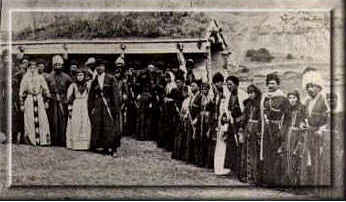
Adigha Habza and Place Assignment
Adigha Habza
By the way (order) adighas sit, stand or walk together, it was possible to tell the age or the position of each group member.
Of the two people, the older one (or a noble, a guest) is supposed to be on the right from the younger one.
Of the three people, the oldest one is in the middle, the younger is on the left, and the youngest takes the right side of the oldest one.
If the one of the three had been a female, she was entitled to stand in the middle regardless of her age (today, mostly, adighas do pay attention to the age of the female; she is the middle if her age allows her that).
If the one of the three is a male, he is in the middle, the females take places according to their age (look above).
If a female stands on the left side from a male, that means nobody (even a noble or a guest, though there are many exceptions for them in other cases) is entitled to approach her to laugh and talk (usually it is a place of a wife).
If the female is on the right side of a male, that means she is a sister, a daughter, or in any other relationship with a man that does not ban other males approach and freely talk to her.
Married female, regardless of her age is of a higher position than an unmarried girl
|
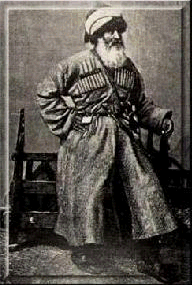
Suitable refferals to people
Adigha Habza
In adigha language there are no refferals such as Lady, Mister, Miss. There are refferances according to people's age and sex.
For example, talking to the stranger girls and boys we say "Si sh'ale" Si H'ijebz tsiq" , "Si dahe" ("My boy", "My girl", "My beauty").
Refering to old peole (strangers or not related) adigha peole could use "Di ade" and "Di ane" ("Our father" and "Our mother").
With real grandfathers and frandmothers we could use such forms as "Si nane" , "Si dade" or even "Si nane dahe" (My good nana), "Si nane dishe" (My golden nana), "Si nane Gupse" (My nana, who is the soul of my heart")
The reason why adighe people put so much tenderness in these referrals is to get the positive rection from the other person.
This often may help the situation.
For example, imagine one litte boy, who had just sweared and fought with other guys on th street . Some strange woman, who had no idea of what has just happened calls him and say: " Mide qaqwot, si sh'ale tsiq, wi tzer qiz-zheat." ("Come hear my little boy, tell me your name.") Sure enough, this little boy is going to feel the pangs of remorse for his previous behavior...
This is how adigha people used kind words to nurture the best qualities and limit the negative ones.
|

Habza of Young Girls
Adigha Habza
"Adigha people say, "What your daughter is now is what she is going to be the rest of her life".
Here are several examples of what an unmarried adigha girl is supposed to be doing according to Adigha Khabza.
- While a girl is living in her family she has to learn to do everything that she will have to do in the family of her husband.
- A girl has to be respectful to her parents and relatives and know how to express this respect correctly.
-A girl is not supposed to be talking among elders until she is invited to talk.
-When anyone, who is at least a year older than the girl, enters a room, she is supposed to stand up, offer her place and wait until the elders are sit before taking a sit herself.
- Words are not respectful by themselves if you do not put respect in them A girl is supposed to know a proper way of talking with elders.
- A girl has to be clean in everything (body and dress, state of mind and life style.
- Girl has to continuously take care of her beauty (behavior, thoughts, look and face). Her inner beauty will overshadow any physical disadvantage."
- It is not appropriate if a girl goes out anywhere for long when the elders are not aware about it.
- Adigha girl shouldnt drink. However, if she was offered a glass she has to accept it and thank the person. After that she may hand over the glass to the male person whom she knows. This is why adighas say, "Drink can be in the girl's hands, but on the lips of a man only".
- Girl has to study and get a profession. It will be her bread in life. There are no useless knowledge or profession.
- Adigha girl had to mind her dignity in any circumstances.
- Talking a lot, laughing aloud in not praiseworthy in Adigha Khabza.
- To know when to joke, and when to speak is a girl's duty and a way to the hearts of people.
- She has to mind her manners not only at people, but also with the closest relatives.
|
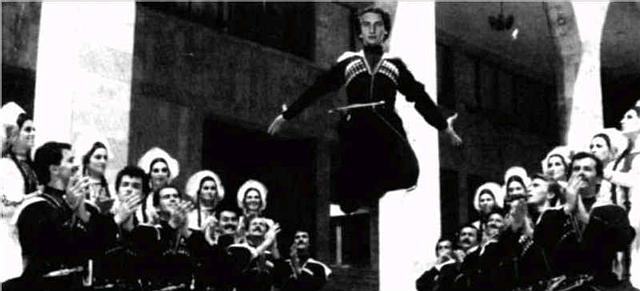
Adigha Dances
There are several dances that are danced on the weddings.
The first one is the KAFE. This is a dance on slow music.
There is the CHECHEN, also known as Lezginka or Islamey. This is a dance, danced on a fast music. The guys are supposed to show their strength and the girls to show their elegance.
There is also a dance, which is danced in a group. It iscalled the WEDGE. Another name for this dance is Simd.
When there is a DJAGU, there is a circle created. On the one side of it are boys and on the other are girls.
Also, there can be guys and girls who control whole Djeg.They are called HATYAKO.
Hatyako are in charge of creating the Right Mood of the djeg. Also they look after everyone's getting his/her turn to dance.
Both sides, as boys as girls have their own Hatyakos.
Of course, telling about it is not enough.
You just have to take part on a Djagu, then you will understand what great feeling that is
|
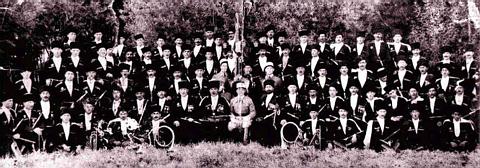
Adigha Habza and elopement
Adigha Habza
Usually the parents of the young people have no jurisdiction over their childrens decisions to marry.
However, the parents may give advices if they do not approve of the marriage. Taking in consideation the high respect for the elders' word the advice of the parents may play crucial role in young people' s decision.
In spite of that fact, when the father or brother of the girl does not approve of her marriage to a certain person, the girl elopes with her husband-to-be, which moves her to the home of one of his friends for the completion of the marriage ceremony. This kind of marriage is known to Circassians as "elopement".
The most important thing here that in this elopement girl isn't forced by anyone to do it.
This elopment is known as "KWASA" (Kabartey word) and "DASHA" (Abzakh word) among the Circassian people.
There are two other reasons why an elopement can happen.
If someone on the girls side (relatives or close friends) don't approve of the marriage, though the parents have given their agreement the girl may elope.
The parents will know that their daughter is eloping, but will act like as if they don't know that their girl is leaving.
The third reason for eloping is when the parents of the boy dont approve this marriage. Then the boy will do the "KWASA".
After the elopment a messenger will be send to the house of the girl and he will tell "Shu Kodugu Tadishi", this means "you are lost at us". By sending the messenger, the "peace" will return.
|
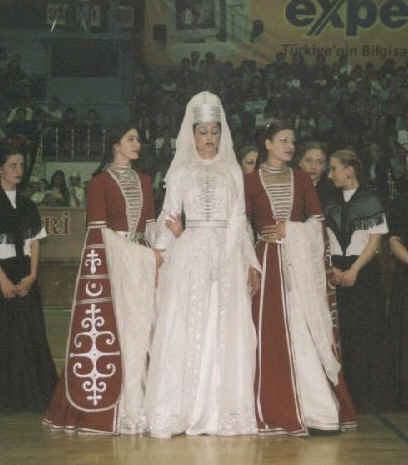
Adigha Wedding
Adigha Habza
When a boy wants to marry a girl, he never will tell that directly to his parents, he let his parents know by friends.
When the parents of the boy think that this is a right choice they will send people that they trust and also know the parents of the girl(psalugh in Kabardey).
This is done to know the opinion of the parents of the girl about the marriage. If the parents are agreed, they will let their guests know about it.
However, there is no chance that they will give the girl the first time away. Psalugh will have to come two, three, four time, until they will not give their daughter to them. It happens because every time the girls side says "We
have to ask it to her grandfather, uncle" and so on. So the people who are asking for the girls hand will have to come several times.
After they give their final agreement, the preparations for the wedding begin.
The wedding lasts 5 days. During this time the bridegroom is at the SHAWO.
The bridegroom isn't seen in public during this wedding. , Only single people (usually friends) are allowed to visit the bridegroom at the SHAWO.
At the last day of the wedding all the friends and relatives go to pick up the bride and take the bride to the bridegrooms house.
After one year after the wedding everyone of the bride side will come and stay at the new home of the girl for 2 or 3 days and they will be treated the best way by the man's side. "Kurman" will be made for the guests.
The visitors come with all different kind of gifts and they also get gifts back for the parents of the girl.
After two year of the wedding the bridegroom will be invited over to the parents of the girl. He is supposed to come with presents.
After these ceremonies the bridegroom is free to go and visit the parents of the girl. Note, that before he wasn't allowed to do so.
|
|
|
